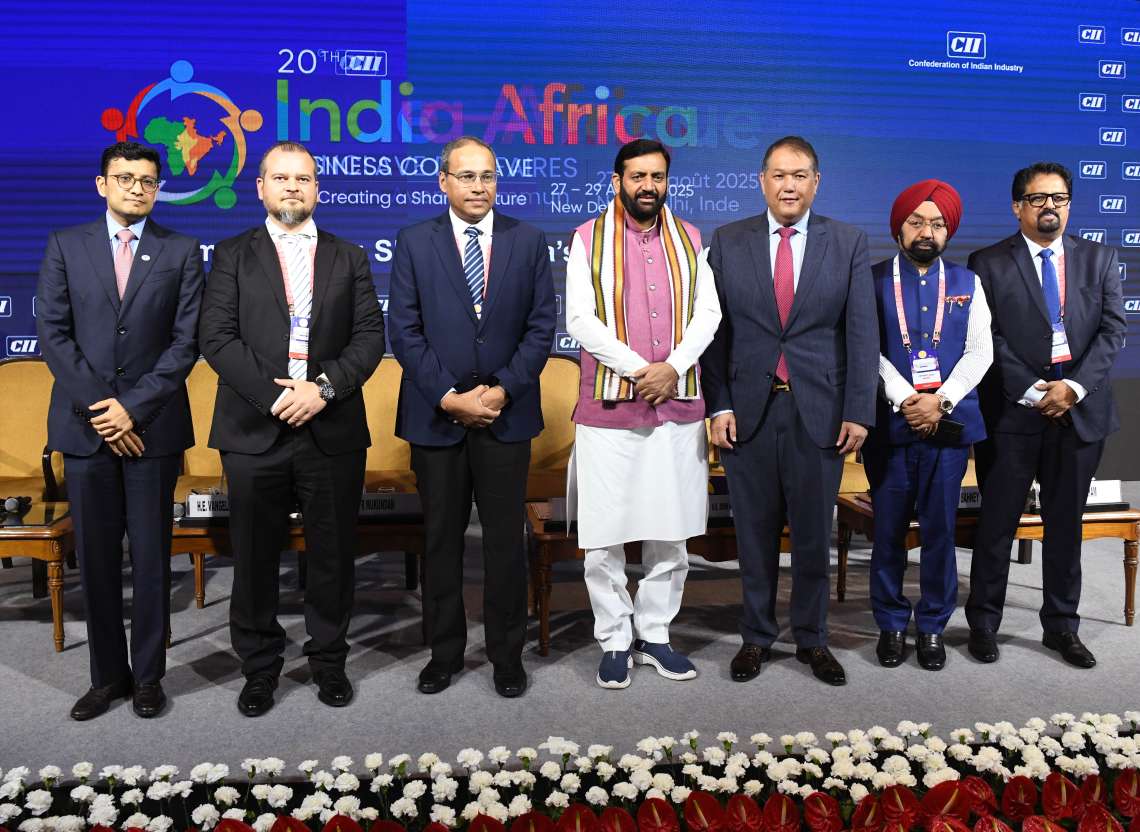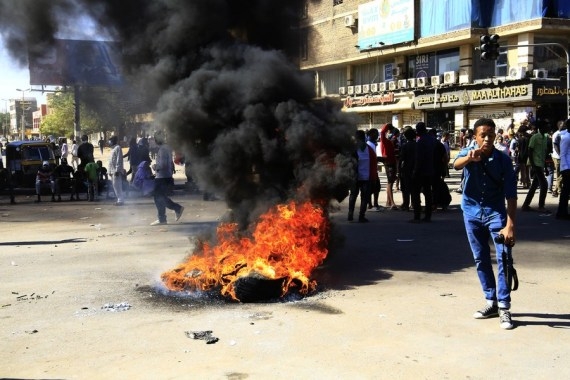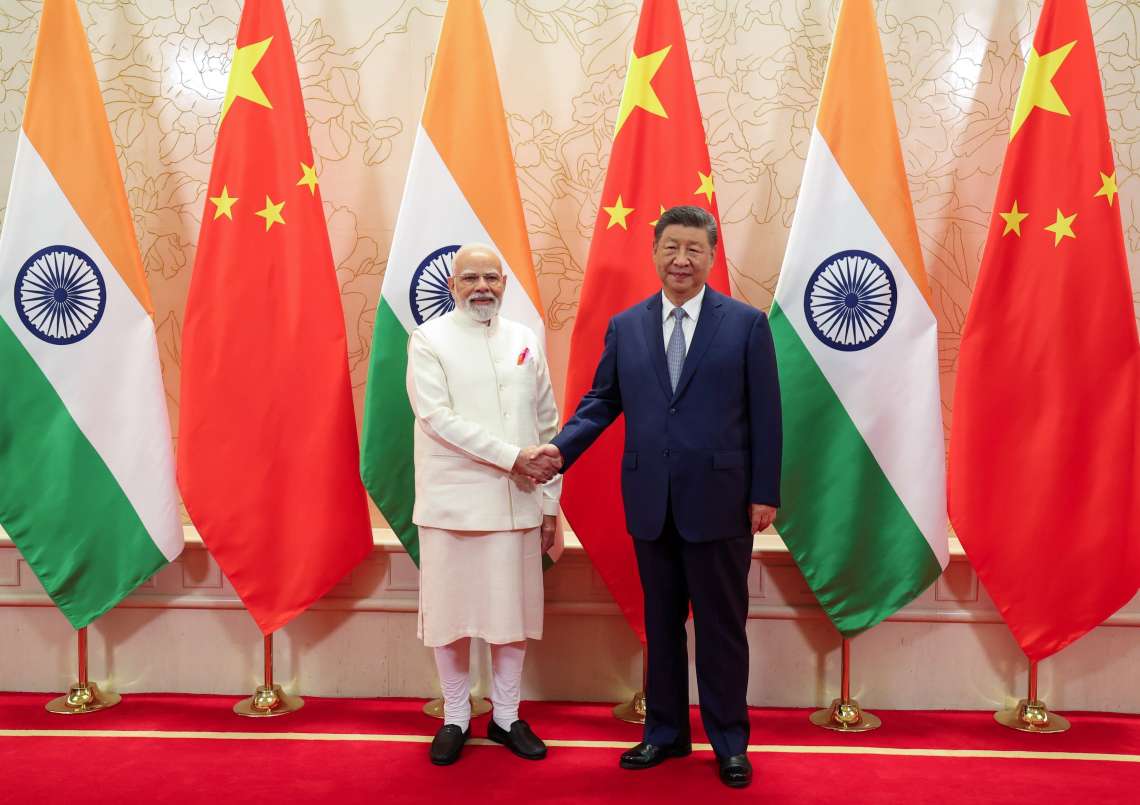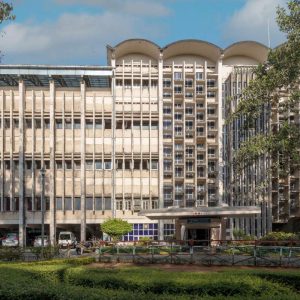20th CII India-Africa Business Conclave in New Delhi drew over 1,600 delegates from 64 countries, underscored a strategic shift in the partnership between the two…reports Asian Lite News
In a landmark moment for South-South cooperation, India-Africa bilateral trade has officially crossed the US$100bn mark for the first time as the Confederation of the Indian Industry (CII) hosted the 20th CII India-Africa Business Conclave in New Delhi.
The event, which drew over 1,600 delegates from 64 countries, underscored a strategic shift in the partnership between the two. India and Africa both face similar headwinds. They have recently been hit by US tariffs and their citizens are feeling increasingly unwelcome in many Western countries. India and Africa are roughly at par when it comes to the size of their respective economies and population. India, however, is far denser and remains a single governing entity, while Africa is not. That presents the latter with a development challenge far more complex to deal with. On the flip side, Africa is endowed with immense natural resources, which India remains, for most part, energy and mineral deficient.
The three-day conclave, organised by CII in partnership with the Ministry of External Affairs and the Ministry of Commerce and Industry, serves as a powerful platform for fostering stronger commercial ties. Indian Union Minister Kirti Vardhan Singh announced the significant trade milestone, highlighting a near-doubling of trade volume in just five years. The robust growth is a testament to the deepening economic engagement between the two regions, buoyed by India’s position as a top five investor in the African continent, with cumulative investments now exceeding US$75bn.
The discussions at the conclave highlighted a comprehensive approach to partnership, moving beyond traditional trade to include development initiatives and capacity building. India has extended concessional loans of over US$12bn and provided US$700m in grant assistance for a diverse range of projects across Africa. In a move to strengthen people-to-people connections, India has also offered 50,000 scholarships to African youth, with more than 42,000 already utilised, nurturing a new generation of leaders and innovators.
A central theme of the event was the newfound synergy in key sectors critical to both regions’ growth. Ministers and industry leaders emphasised collaboration in agriculture and food processing, defence, physical and digital connectivity, and clean energy. The focus on digital transformation was seen as a major opportunity for India to share its expertise in building robust, scalable digital infrastructure. The pivotal inclusion of the African Union as a permanent member of the G20, under India’s presidency, was also lauded as a crucial step towards Africa’s greater integration into the global economic architecture.
The conclave concluded with a collective resolve to build a new paradigm of partnership based on mutual respect, trust, and shared aspirations. As Africa and India face common challenges and opportunities, the success of the 20th CII India-Africa Business Conclave signals a promising new era of co-creation, where both regions can leverage their collective strengths to forge a prosperous and resilient future together.
Union Minister of Commerce and Industry Piyush Goyal on Friday stated that India and Africa will collaborate to double bilateral trade by 2030, with a focus on value addition, technology-driven farming, renewable energy, and healthcare.
Addressing the valedictory session of the 20th CII India-Africa Business Conclave in New Delhi, Goyal stated, “Together, we can move from raw material exports to value-added production for global markets.”
Currently, India’s exports to Africa stand at USD 42.7 billion, while imports are close to USD 40 billion. Calling this balance encouraging, Goyal underlined that much more could be achieved. “This demonstrates the opportunity we have missed out on over the years, and the scope for expansion today,” he observed.
The minister highlighted the complementarities between the two regions, pointing to areas such as agriculture, food security, self-help groups, education, skills development, start-ups, healthcare, and renewable energy. He also drew attention to the automobile sector, where Africa imports vehicles worth USD 20 billion annually, but India supplies only USD 2 billion of that demand.
Goyal said that Indian vehicles, known for their cost competitiveness and quality, could help Africa meet the rising demand for passenger and commercial vehicles, as well as two- and three-wheelers, and affordable electric mobility.
In return, India could expand imports of African resources, including critical minerals, petroleum, and farm produce. This balanced exchange, he said, would help both regions expand trade, generate employment, and build long-term industrial partnerships.
Goyal stressed that the billion-plus population of Africa shares aspirations similar to India’s vision of becoming a developed nation by 2047. He said Africa could support India’s mineral and energy needs, while India could contribute to Africa’s food security, manufacturing, and digital services. He also highlighted India’s strengths in IT, AI, telecom, and medical tourism.
Citing India’s bond with Mauritius, he assured continued support in easing inflationary pressure on food essentials. Goyal further said that India’s digital payment system, UPI, could help Africa reduce transaction costs and strengthen financial systems.
“India and Africa together represent over two billion people and one-third of the global population. Our shared history, freedom struggles, and enduring friendship provide a strong foundation for the future,” Goyal said, invoking Mahatma Gandhi’s years in South Africa as a symbol of these ties.
He urged African nations to join India on global platforms, such as the WTO, calling the Global South the true voice of the developing world. Inviting African countries to expand engagement with India, he said, “Our relationship is not just about history or trade — it is about shared dreams, shared challenges, and shared solutions. Together, we can transform our economies, empower our youth, and ensure prosperity for every citizen. The future is ours to capture.”














